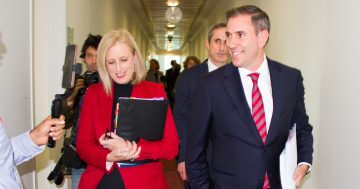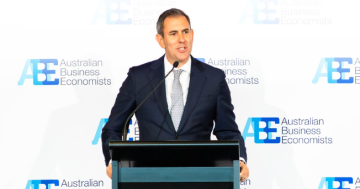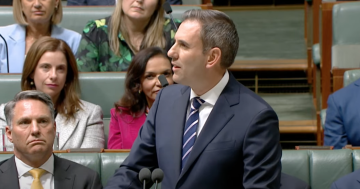
Treasurer Jim Chalmers says there will be no big cash splashes in the May budget.
The Federal Budget is only two months away and Treasurer Jim Chalmers has moved to prepare Australians for a low-spending document, with most of the government’s cost-of-living initiatives already announced.
A decline in iron prices means revenue will not be as strong as Labor’s past two budgets.
Commodity prices in general are ahead of predictions but not like they have been in previous budgets with their post-COVID tax boon.
It all means that while a surplus is still likely, it won’t be as big as the government expected to deliver.
Delivering a speech to the Committee for Economic Development of Australia (CEDA) on Thursday (14 March), Dr Chalmers said the May budget would deliver some more cost-of-living measures, particularly for low-income households, but there would be no big cash splashes.
“The three biggest drivers of our thinking about this third budget [are] global uncertainty, persistent cost-of-living pressures, and slowing growth,” he said.
“The revenue upgrades will be smaller. In each of our first two budgets, we benefited from more than $100 billion in revenue upgrades.
“This year, we won’t see anything like that.
“In fact, we are even looking at much less than the $69 billion we booked in the latest mid-year budget update.”
Big spending measures already announced include superannuation on paid parental leave, amended stage three tax cuts for all, and specific remote housing initiatives.
The budget will likely also go to spending on aged care, university funding and an expansion of the NDIS.
“Any extra help will be targeted, responsible and affordable,” Dr Chalmers said.
“There will not be big cash splashes in the budget, simple as that.
“We are already providing a tax cut to every taxpayer, and a bigger tax cut to more workers; we need to be upfront and say that any additional help will only be a fraction of that.”
Neither will the government be able to bank as much as it had hoped to be able to.
In its Mid-Year Economic and Fiscal Outlook (MYEFO), delivered in December, the government outlined an extra $64.4 billion. A “substantial amount of the upward revision, but not all of it” will be banked.
“Twice our predecessors banked none of their upgrades, even when one was bigger than we are expecting this time around,” Dr Chalmers said.
“We are still committed to banking as much as we can.”
A softening of the labour market is also impacting the bottom line.
The Treasurer noted that at the end of last year, there were 14.2 million Australians in work.
“This is around 500,000 more than Treasury was forecasting at the time of the election,” he said.
“We welcome this, but we don’t expect to get such upside forecast surprises this time around.”
The government has this week also announced it will introduce a financial sector regulatory initiatives grid to make sure the standard business of regulation is carried out in a more coordinated way.
It says the move will make it “simpler and easier” to do business in Australia.
Modelled on the one in place in the United Kingdom, the grid will be a rolling, 24‑month forward program of regulatory initiatives that will materially affect the financial sector.
This includes banking, credit, insurance, superannuation, investment, payments, and capital market entities, updated twice a year.
Dr Chalmers said the grid would be established and administered by Treasury and include proposed legislation, rule, and regulation and standard making, consultation processes, and data collection processes.
And it would also include initiatives of agencies including the Australian Securities and Investments Commission (ASIC), the Australian Prudential Regulatory Agency (APRA), the Australian Competition and Consumer Commission (ACCC), the Reserve Bank of Australia (RBA), and the Australian Taxation Office (ATO).
“By engaging with industry, we believe we get better outcomes and that’s what this is all about – promoting transparency, collaboration and engagement with the private sector is an important part of our economy,” Dr Chalmers said.
“A regulatory grid will help financial services businesses engage with the government and regulators more effectively and allow regulators to avoid duplication, build shared strategic priorities, and focus on how to best implement reforms.
“It will also allow entities to allocate their resources more efficiently when implementing regulation – reducing compliance burden and costs.
“The grid will give financial services providers – particularly medium-sized and smaller players – clear visibility of regulation that might impact their businesses and will support engagement with proposed reforms and their implementation.”




















